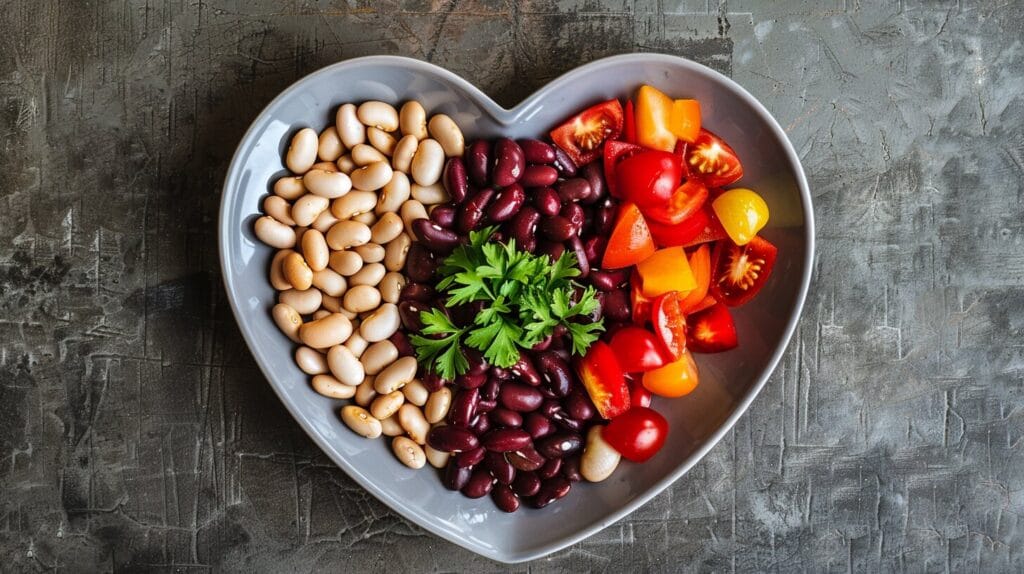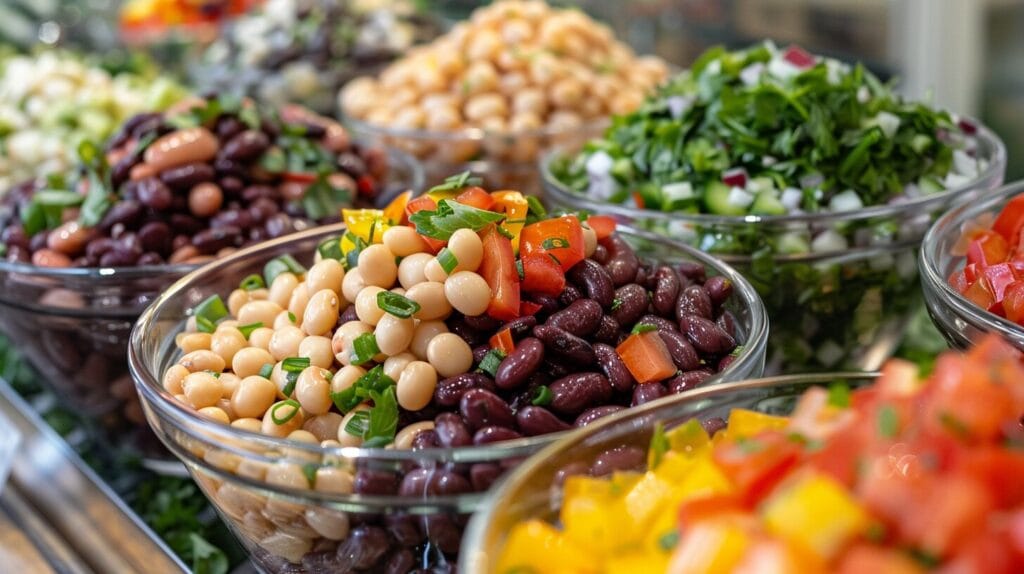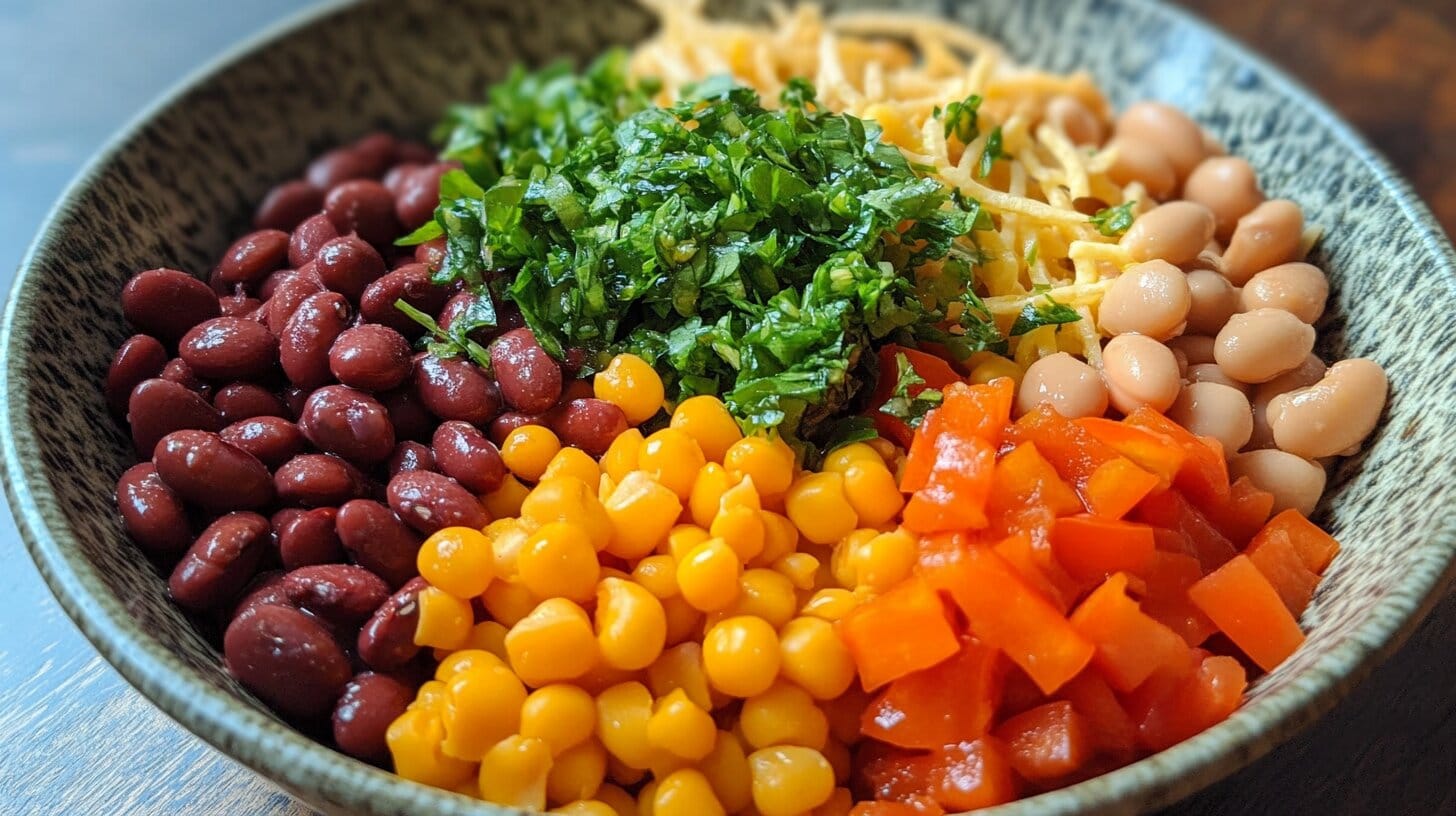Why should you eat a dense bean salad today? Picture this – a vibrant bowl filled with colorful beans, crunchy vegetables, and a zesty dressing. Not only does it look appetizing, but it’s also packed with nutrients that can boost your health in more ways than one. A dense bean salad is more than just a side dish; it’s a nutritional powerhouse that can serve as a complete meal.
Beans are often overlooked, yet they provide essential nutrients our bodies need. Rich in protein, fiber, and various vitamins, bean salads are a go-to option for those looking to eat healthily without sacrificing flavor. Whether aiming to improve heart health, manage your weight, or enjoy a quick and satisfying meal, bean salads fit the bill.
This article explores why you should eat a dense bean salad today, uncovering its health benefits, sustainability, and budget-friendly advantages.
Table of Contents
The Nutritional Powerhouse of a Dense Bean Salad

Beans are small but mighty. Combined with a dense bean salad, they offer a balanced mix of macronutrients and essential vitamins. Let’s break down their impressive nutritional profile.
Protein-Packed and Plant-Based Benefits of Bean Salads
For vegetarians and vegans, dense bean salads are a game-changer. They provide a plant-based source of protein, essential for muscle repair, growth, and overall energy. Unlike animal protein, beans are cholesterol-free, making them a heart-healthy option. For example, a cup of black beans contains around 15 grams of protein. This is one of the many reasons you should eat a dense bean salad today – it delivers the protein your body needs naturally, plant-based.
If you’re cutting down on meat or seeking healthier alternatives, adding dense bean salads ensures you meet your daily protein needs. Plus, the variety – chickpeas to kidney beans – keeps things exciting. Whether as a main course or a side, dense bean salads are a simple, delicious way to boost your nutrition.
Fiber for Digestive Health in Bean Salads
Fiber is one of the key components that makes beans stand out. A rich bean salad can give you up to half the fiber you need daily in just one portion. This fiber not only aids digestion but also keeps you feeling full longer, helping with weight management.
Additionally, fiber reduces the risk of developing conditions like constipation, diverticulitis, and even certain cancers. Regularly eating bean salads can improve your gut health while enjoying a tasty meal.
Rich in Vitamins and Minerals: Why Dense Bean Salads Are Essential
Beans are brimming with essential vitamins and minerals. Folate, iron, potassium, and magnesium are just a few that contribute to overall well-being. Folate is particularly crucial for pregnant women, as it aids fetal development.
Meanwhile, the potassium in beans helps regulate blood pressure, and iron supports the production of red blood cells. A dense bean salad delivers a significant nutrient boost, ensuring your body functions at its best.
Would you like me to continue with the health benefits and other sections? Let me know if you’re ready for the next part!
Health Benefits of Eating a Dense Bean Salad
Eating a dense bean salad is not just about enjoying a tasty dish it’s a smart move for your health. Beans are a nutritional goldmine that can help prevent chronic illnesses and improve overall well-being. Let’s dive into the health benefits of incorporating more bean salads into your diet.
Heart Health and Lowering Cholesterol with Dense Bean Salads
One of the main advantages of beans is their capacity to improve heart health. Numerous studies have shown that consuming beans regularly can lower LDL cholesterol (the bad kind) and improve overall heart function. How does this work?
Beans contain soluble fiber, which binds to cholesterol in the digestive system and helps the body eliminate it before it can clog arteries. The potassium and magnesium in beans also play a role in reducing blood pressure, contributing to a lower risk of heart disease.
A dense bean salad, filled with different varieties like black beans, chickpeas, and kidney beans, provides a heart-friendly meal that’s as delicious as it is beneficial.
Weight Management and Satiety with Bean Salad Meals
Struggling to manage your weight? A dense bean salad can be your secret weapon. The combination of fiber and protein in beans helps you stay full longer, reducing the temptation to snack between meals. This dual-action makes bean salads incredibly satisfying without piling on unnecessary calories.
Studies have found that people who consume beans regularly have a lower body weight and a smaller waist circumference than those who don’t. The slow-digesting nature of beans stabilizes blood sugar levels, preventing energy crashes that lead to cravings.
Regulating Blood Sugar Levels
For those managing diabetes or looking to prevent it, beans are a must-have. Their low glycemic index means they cause a slower rise in blood sugar, helping to maintain stable glucose levels throughout the day.
When you pair beans with fiber-rich vegetables in a salad, you create a meal that balances carbohydrates, preventing sharp spikes in blood sugar. This supports long-term health and reduces the risk of type 2 diabetes.
Boosting Energy and Combating Fatigue
Iron deficiency can lead to fatigue and low energy levels, but beans are a natural source of iron. A dense bean salad, especially one with kidney beans or lentils, provides a significant iron boost.
Adding vitamin C-rich ingredients like tomatoes or bell peppers can enhance iron absorption, making your bean salad even more effective in combating tiredness.
The Versatility of Bean Salads

One of the best things about bean salads is their versatility. Bean salads can quickly adapt to your taste if you prefer spicy, tangy, or mild flavors. This makes them a perfect addition to your weekly meal rotation.
Customizable with Different Ingredients
Strict recipes don’t bind a dense bean salad. You can mix and match a variety of beans – black beans, chickpeas, lentils, or cannellini – with different veggies, herbs, and dressings. The beauty lies in the endless combinations you can create.
Here are a few ideas to personalize your salad:
- Mexican Style – Black beans, corn, avocado, red onion, and a lime-cilantro dressing.
- Mediterranean Twist – Chickpeas, cucumber, cherry tomatoes, olives, feta cheese, olive oil, and lemon.
- Middle Eastern Inspired – Lentils, diced cucumber, parsley, and tahini dressing.
The ability to swap ingredients based on what you have on hand makes bean salads practical, reducing food waste and ensuring you never get bored.
A Perfect Meal for Any Season
Whether it’s summer or winter, bean salads fit any season. A chilled bean salad with crisp veggies is refreshing and light during warmer months. Warm bean salads with roasted vegetables can be a hearty, comforting dish in colder weather.
Bean salads can also be a perfect side dish for barbecues or a main course for plant-based eaters. The temperature flexibility of bean salads makes them one of the most adaptable meals you can prepare.
Simple and Quick to Prepare
One of the biggest perks of a dense bean salad is how effortlessly it comes together. Whether you’re a seasoned chef or a beginner in the kitchen, preparing a dense bean salad takes minimal effort but delivers maximum flavor and nutrition. This simplicity is another reason you should eat a dense bean salad today – it’s quick to make, packed with essential nutrients, and perfect for any meal.
With just a few ingredients and a little creativity, dense bean salads can transform into a satisfying, wholesome dish that fits seamlessly into your busy lifestyle.
Basic Recipe for a Dense Bean Salad
Here’s a quick and easy recipe you can whip up in under 15 minutes:
Ingredients:
- 1. Can of black beans (drained and rinsed)
- 1 can of chickpeas (drained and rinsed)
- 1 cup of kidney beans (cooked or canned)
- 1 cup cherry tomatoes (halved)
- 1 red bell pepper (diced)
- ½ red onion (finely chopped)
- ¼ cup fresh cilantro or parsley (chopped)
- 1 avocado (diced)
- Juice of 2 limes
- 3 tbsp olive oil
- 1 tsp cumin
- 1 tsp paprika
- Salt and pepper to taste
Instructions:
- Mix all the tomatoes, beans, onion, bell pepper, and avocado in a large bowl.
- Whisk together lime juice, olive oil, cumin, paprika, salt, and pepper in a small bowl.
- Serve the dressing on top of the bean mix and mix until everything is coated.
- Garnish with fresh cilantro or parsley and serve immediately or chill in the fridge for an hour to enhance flavors.
Meal Prep and Storage Tips
Dense bean salads are ideal for meal prepping. Here’s how you can keep your salads fresh:
- Refrigeration – Keep the salad in a sealed, airtight container for 5 days. Beans soak up flavors over time, making leftovers even tastier.
- Separate Dressings – If you’re meal prepping for the week, keep the dressing separate and mix it in before serving to avoid soggy veggies.
- Add Avocado Fresh – To prevent browning, add avocado just before serving.
Environmental and Economic Benefits
Beyond being delicious and healthy, bean salads offer significant environmental and economic advantages. By choosing beans as a meal staple, you contribute to sustainability and save money.
Low Environmental Impact
Beans are one of the most environmentally friendly protein sources available. Growing beans requires significantly less water, land, and energy than meat production. Additionally, beans naturally enrich the soil by fixing nitrogen, reducing the need for chemical fertilizers.
A diet incorporating more plant-based meals like dense bean salads helps lower your carbon footprint, making it a simple yet effective way to combat climate change.
Affordable and Budget-Friendly
Beans are not only good for the planet but also for your wallet. They are among the most affordable protein sources, costing far less than meat, fish, or even some grains. A can of beans often costs less than a dollar, making it easy to prepare a large, nutritious meal without breaking the bank. This affordability is another reason you should eat a dense bean salad today – it provides excellent nutrition without straining your budget.
Frequently Asked Questions (FAQ):
1. How Often Should I Eat Bean Salads?
Eating bean salads 2-3 times a week can significantly improve your overall health. Beans are nutrient-dense, and regular consumption supports heart health, digestion, and weight management. However, even adding them once a week can make a noticeable difference. If you’re curious about how to prepare a nutrient-rich bean salad, check out The Best Dense Bean Salad Recipe for Busy Weeknights.
2. Can I Use Canned Beans for Bean Salads?
Yes! Canned beans are convenient and just as nutritious as dried beans. Make sure you rinse them thoroughly to decrease the sodium content. If you prefer lower sodium options, look for canned beans labeled “no salt added.” Read How to Reduce Sodium in Canned Chili – 7 Simple Fixes for more insights into managing sodium levels in recipes.
3. Are There Any Side Effects of Eating Too Many Beans?
Beans are high in fiber, which can sometimes cause bloating or gas if consumed in large amounts. To reduce this, introduce beans gradually into your diet and ensure they are adequately cooked. Soaking dried beans overnight can also minimize digestive discomfort. If you’re wondering about the shelf life of bean salads, explore How Long Will Bean Salad Last in the Fridge?
4. What Are the Best Beans for Salads?
Popular options include chickpeas, black beans, kidney beans, and cannellini beans. Mixing different types creates a richer texture and flavor. Lentils and edamame also work well in dense bean salads. To understand why beans are perfect for this dish, read Why It Is Called a Dense Bean Salad.
5. How Can I Make My Bean Salad More Flavorful?
Add fresh herbs like cilantro, parsley, or mint. Spices such as cumin, paprika, and chili powder can enhance the flavor. A splash of citrus (lime or lemon) or a drizzle of balsamic vinegar adds brightness to the salad. Don’t forget to experiment with different dressings to keep things interesting. For inspiration, visit Outback House Salad – A Fresh and Tasty Recipe.
Conclusion
A dense bean salad isn’t just a healthy meal option – it’s a nutritional powerhouse, an environmentally friendly choice, and a cost-effective addition to your diet. Packed with protein, fiber, vitamins, and minerals, bean salads can boost heart health, regulate blood sugar, and help with weight management.
Their versatility makes dense bean salads perfect for any meal in any season. With endless ingredient combinations and simple preparation methods, dense bean salads are a go-to dish that fits into every lifestyle. The environmental and economic benefits make them a win-win for you and the planet. This flexibility highlights why you should eat a dense bean salad today – it’s a sustainable, affordable, and delicious option you can enjoy year-round.
So why wait? Whip up a delicious, dense bean salad today and start enjoying this superfood-packed dish’s many benefits!
